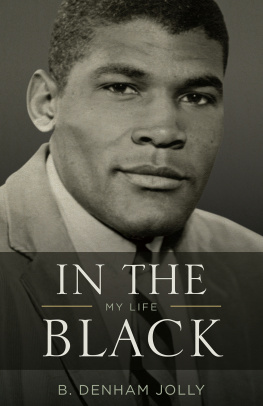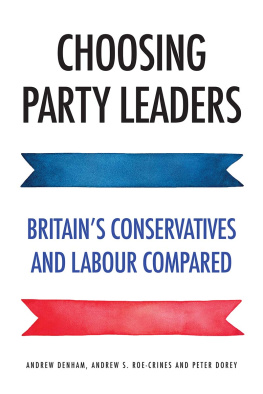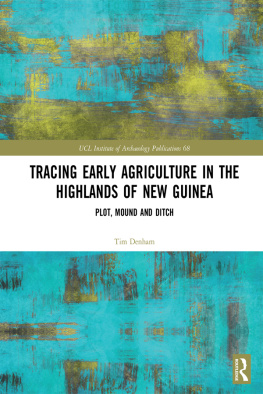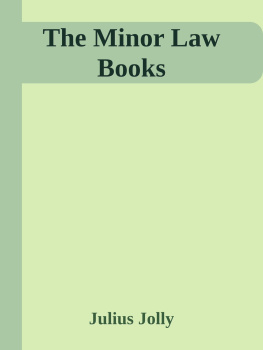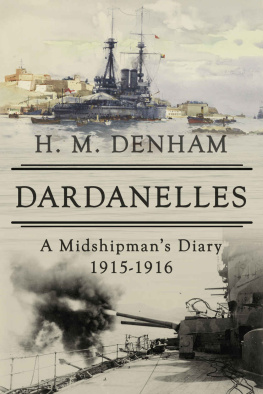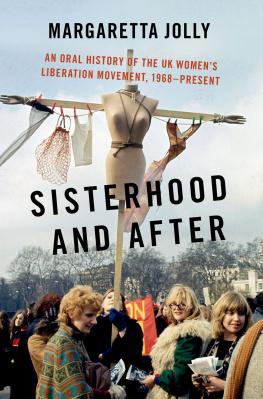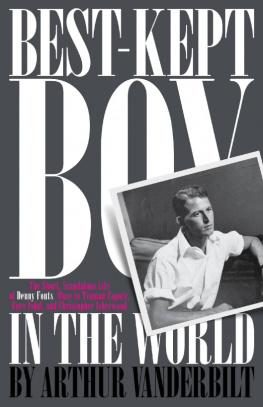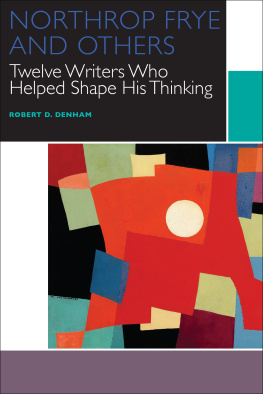B. Denham Jolly - In the Black: My Life
Here you can read online B. Denham Jolly - In the Black: My Life full text of the book (entire story) in english for free. Download pdf and epub, get meaning, cover and reviews about this ebook. year: 2017, publisher: ECW Press, genre: Home and family. Description of the work, (preface) as well as reviews are available. Best literature library LitArk.com created for fans of good reading and offers a wide selection of genres:
Romance novel
Science fiction
Adventure
Detective
Science
History
Home and family
Prose
Art
Politics
Computer
Non-fiction
Religion
Business
Children
Humor
Choose a favorite category and find really read worthwhile books. Enjoy immersion in the world of imagination, feel the emotions of the characters or learn something new for yourself, make an fascinating discovery.
- Book:In the Black: My Life
- Author:
- Publisher:ECW Press
- Genre:
- Year:2017
- Rating:3 / 5
- Favourites:Add to favourites
- Your mark:
- 60
- 1
- 2
- 3
- 4
- 5
In the Black: My Life: summary, description and annotation
We offer to read an annotation, description, summary or preface (depends on what the author of the book "In the Black: My Life" wrote himself). If you haven't found the necessary information about the book — write in the comments, we will try to find it.
In the Black: My Life — read online for free the complete book (whole text) full work
Below is the text of the book, divided by pages. System saving the place of the last page read, allows you to conveniently read the book "In the Black: My Life" online for free, without having to search again every time where you left off. Put a bookmark, and you can go to the page where you finished reading at any time.
Font size:
Interval:
Bookmark:

B. Denham Jolly

To my grandson
Elias James Jolly Klym
Who has brought new joy and meaning to my life.
When you are Black in Canada, the arrival of the police on the scene is not always, or even often, reassuring.
Three years ago, on Parliament Street in Torontos Cabbagetown neighbourhood, not far from where I live, I had a fender bender. I was exchanging insurance information with the other driver when a police officer came to take charge of the situation. There was nothing really for him to do, but he told me that I should call a tow truck to get my car towed away.
I told him, very politely, that it wasnt a problem. The car was only dented, and I could easily drive it to a garage. But he insisted.
When I balked, he immediately escalated. You have to get a tow truck, he said.
I found this incomprehensible towing a car away when it only had a dent. But the officer looked at me contemptuously.
What do I have to do to make sure you do, put a gun in your face?
For a moment, I could not believe my ears. A threat like that, made almost casually on a busy Toronto street. I was in my late seventies and my first thought was, what if I had been a Black kid in his twenties? Would he have threatened to draw his gun or have simply done so? Far too often in Torontos recent history that had been the case, and dozens of Black kids had been killed that way.
That thought angered me, but I was not seeking a confrontation. I said nothing. I called the tow truck.
But I did not want to let the matter pass. I filed an official complaint with the department. I made it clear that I wasnt asking that the officer be fired but that he receive some kind of counselling to address his threatening behaviour before someone was hurt.
At first, the department brushed aside my complaint with the excuse that the officer was already in trouble for other indiscretions and he was about to be charged. This turned out to be untrue. I pursued my case as far as I could, but it was clear the Toronto police department wasnt interested in dealing with it. I complained and appealed all the way to the chief of police, Bill Blair.
The departments investigation showed that the officer had his body speaker turned off during the confrontation. They believed him when he denied saying those words. The verdict was clear. We cant substantiate your claim. End of story.
I did get to see the police report, however, and the opening phrase told me everything I needed to know about what was behind the incident. The report began with, The complainant, a seventy-seven-year-old Jamaican immigrant...
At the time, I had lived in Canada more than fifty-five years, longer than the officer had been alive, and I had been a citizen for almost fifty years. If I had been a white man, my origins would have been irrelevant. But a Black man, by definition, had to be identified as the other, not as someone who had been a Canadian for half a century. I was forever a Jamaican immigrant. That is why he could threaten to put a gun in my face and then lie about it.
Who would believe a Jamaican immigrant?
Part of my story is about Canadas uncomfortable struggle with Blackness, which I experienced that day on Parliament Street and on thousands of other occasions. This is a reality in Canada. Even though the first Black in Canada, Mathieu da Costa, arrived with Samuel de Champlain in 1603, Blacks were prevented from settling in Canada in any great numbers until well into the 1970s and that legacy of exclusion continues today.
I arrived on a student visa two decades before the immigration gates were opened to any degree. I am today, even though I visit Jamaica often, thoroughly Canadian. But I hope I will not disappoint my white Canadian friends, of which I am happy to have many, when I say I am not one of those who unrelentingly sing the praises of my adopted country. Despite meeting many nice people, I discovered when I arrived in Canada that it was an unapologetically and insistently white country with a tiny Black minority kept at a fairly steady .02% of the population and largely assigned to jobs as domestics (for women) and railway porters (for men). Things have improved, of course, and the fight to make a better Canada is part of the story I am telling here, but Canada still has a distance to go before it lives up to its ideals.
This is a story of progress made, as well as the challenges remaining. My journey is the journey of a Jamaican who left his country at the age of twenty and who has been part of the evolution in Canada since 1955. Now, as I have entered my eightieth year, I would like to lay down a record of my personal experiences and recount something of the Black struggle in Canada in the last half of the twentieth century and the beginning of the twenty-first. Along the way, I would like to introduce readers, Black and white, to some remarkable women and men that I have had the privilege of knowing and often fighting alongside over the past many decades. These Black Canadians are important for our people to know because they are part of our inspiring legacy in this country. They are important for white people to know because they worked, often in opposition to governments and enforcement bodies, to make Canada a better, more just country. This is an opportunity for you to get to know them, and for the white reader to better get to know Black Canada.
This, I believe, is essential if we are truly to build a harmonious society together. Youll notice, though, that I do not say get to know each other. Because the fact is, we Black Canadians already know white Canada very well. We have to. We know you the same way that the hare knows the lion, from following its every move. And for the same reason. Because in certain circumstances, you can be dangerous to us. My hope is that when you, the white reader, let yourself know us in a more profound way, you will become a little more human and a little less the lion in your dealings with us.
So I welcome all of you, Black and white and all my brothers and sisters of other races, to accompany me on my journey into our collective past. My story is largely a Canadian one because it is in Canada where I built a life, first as a student, then as a high school teacher, and finally as a businessman and media owner and activist. But it begins in a little village in Hanover Parish in Jamaica at a time when Britannia still ruled the waves and most of our small blue planet.
As it turned out, the Empire would even be involved in my naming.
It was August 26, 1935, and my mother was lying in labour with her second child in an upstairs room in our house. Someone had already sent for the doctor, but he had not yet arrived, and my father was waiting nervously on the side of the road when a passing labourer told him that the newly appointed British governor was touring the Island; that afternoon, he was scheduled to drive through Industry Cove, our hamlet in Hanover Parish just north of the town of Green Island. My father, Benjamin Augustus Jolly, was already in his mid-fifties. He was far from a British loyalist. In fact, he was not really interested in politics at all, but for some reason, perhaps to kill time while he waited for news of my birth, he decided to look around for a Union Jack to fly from the flagpole near the road where the new governor would be passing. If nothing else, this simple act would kill another half an hour while he waited for the results of my mothers labour.
Font size:
Interval:
Bookmark:
Similar books «In the Black: My Life»
Look at similar books to In the Black: My Life. We have selected literature similar in name and meaning in the hope of providing readers with more options to find new, interesting, not yet read works.
Discussion, reviews of the book In the Black: My Life and just readers' own opinions. Leave your comments, write what you think about the work, its meaning or the main characters. Specify what exactly you liked and what you didn't like, and why you think so.

